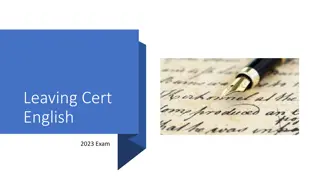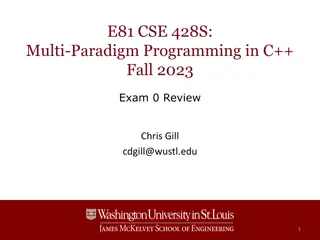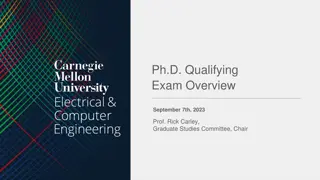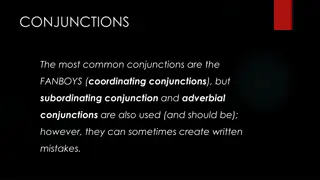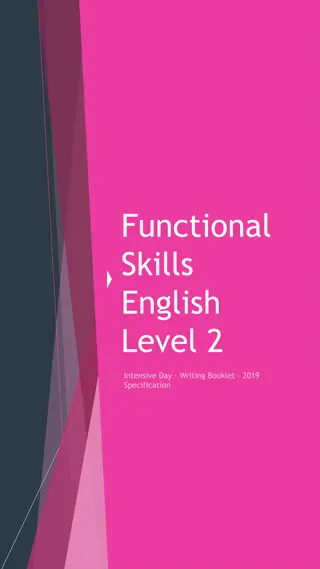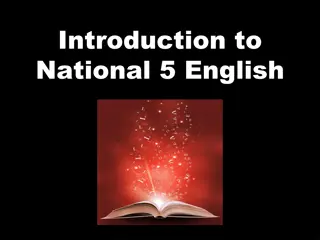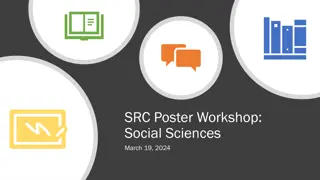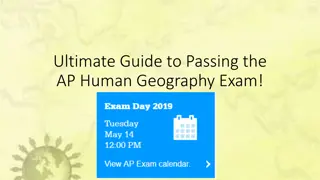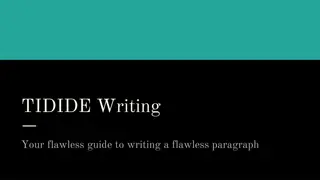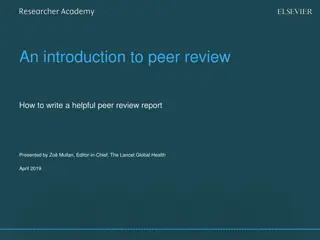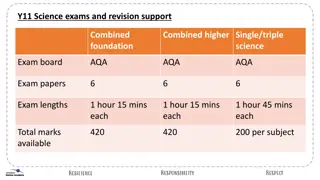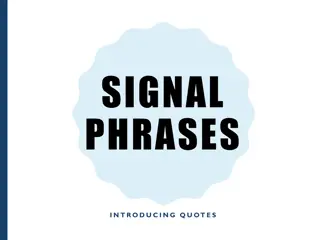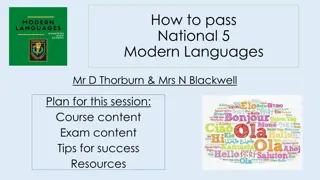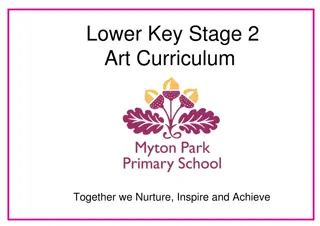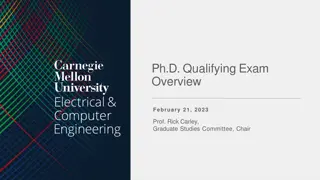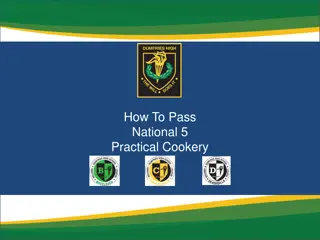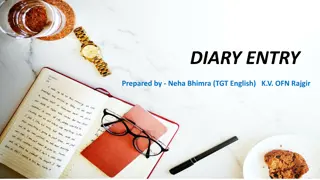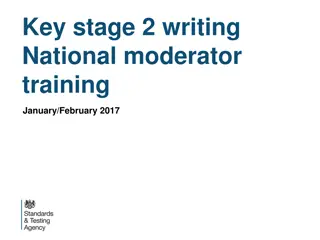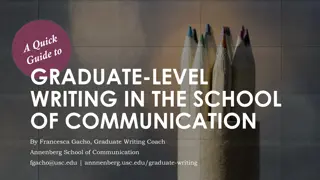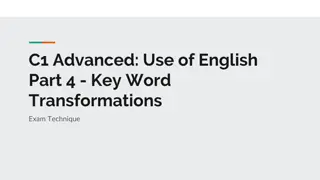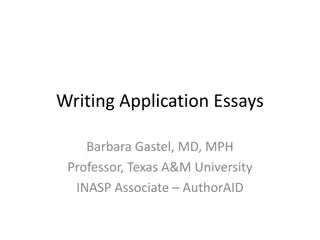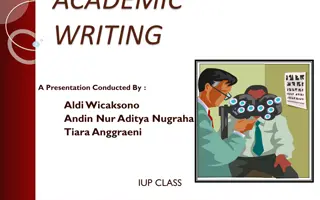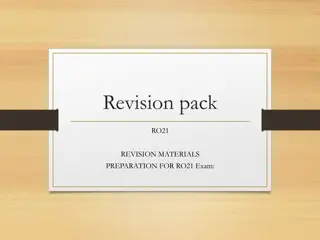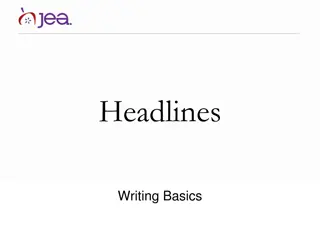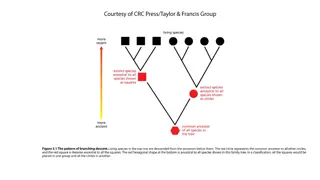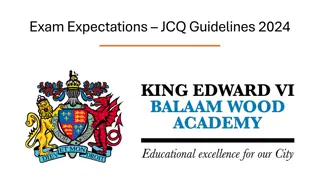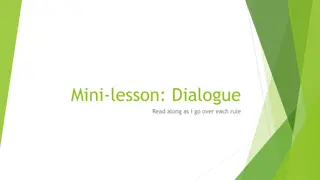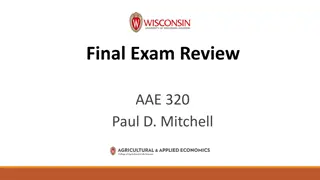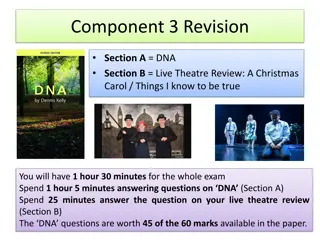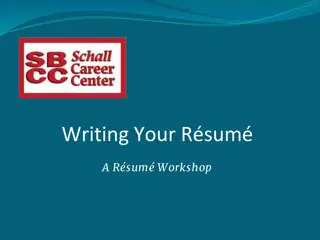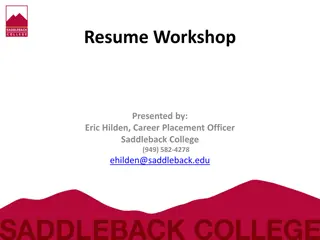Mastering the Art of Review Writing: Tips, Examples, and Exam Strategies
Explore the essentials of crafting compelling reviews, understand the key components such as topic, audience, and purpose, learn about tone and formatting considerations, delve into sample examination questions, and grasp the fundamentals of effective review writing. Unveil the secrets to engaging your readers and conveying your opinions persuasively through reviews.
Download Presentation

Please find below an Image/Link to download the presentation.
The content on the website is provided AS IS for your information and personal use only. It may not be sold, licensed, or shared on other websites without obtaining consent from the author. Download presentation by click this link. If you encounter any issues during the download, it is possible that the publisher has removed the file from their server.
E N D
Presentation Transcript
Eduqas GCSE English Language Writing Tasks Reviews
Aims of this presentation introduce review writing discuss features of review writing revisit previous review writing tasks share tips and look at how to write a successful review consider sample plans and extracts provide full marked examples link to a revision sheet on review writing
Introduction to review writing What do you need to know? Topic What are you reviewing? How do you feel about the topic? What are your views about it? Audience Have you been given a specific audience? Who is the review aimed at? What do you need to include to engage the audience? Purpose What does your review aim to achieve? Are you trying to persuade others to watch/not watch a film? Are you reviewing something positive or negative?
Introduction to review writing What do you need to know? Register What is the appropriate tone for your writing? When writing a review you need to consider the tone of your writing. If you love what you are reviewing, your tone will be positive, light and fully engaging. If you dislike what you are reviewing you may be sarcastic, negative, dismissive and rude about it. Format What do you need to know about layout? There are no specific rules for writing a review but you should give your review a clear title. All reviews should be organised into paragraphs. Make sure you conclude your review with final recommendations and perhaps a rating.
Sample examination questions Writing a review exam tasks: 2019 Write a review for a teenage magazine of a book, film or TV programme/series that you have enjoyed in the last year and why it might appeal to others of your age. Sample exam questions Write your review. [20] Writing a review sample tasks: Write a review of your school or college based on your experiences there. Write your review. [20] Write a review of a book, CD or film of your choice. Write your review. [20]
Getting to grips with writing a review A review is an evaluation. You can review most things - books, articles, films, cars, buildings, art, fashion, restaurants, music, and many more. In an exam, it is likely that you would be asked to review something familiar to you. A review makes an argument - it is a commentary, not just a summary. Unless you are specifically told to write a positive review, you can choose what you say about the thing you are reviewing. Always state your opinions, give some supporting reasons, and add a conclusion with recommendations and perhaps a rating. Reviews share some common features: A review gives the reader a short summary of the piece. This can include a brief description. A review offers a critical assessment you need to include your opinions or reactions to the work being reviewed. Consider if it was effective or persuasive. Did you love it or hate it? A review often suggests whether or not the reader would appreciate or like it.
Getting to grips with writing a review Top Tips for Writing a Review 1. In your plan, write down the points you want to get across. 2. Mention the name of the author/director or anything specific and clearly name the thing being reviewed in the title and first paragraph. 3. Try to get the main theme/idea of the thing you are reviewing across at the beginning of the review. Your reader should immediately know what it is about. 4. Think about the wider aspects of what you are reviewing. Consider actors, sequels, music, similarities to other things 5. What do you like or dislike about it? Try to be blunt. Is it funny? What bores you about it? What is the author's/narrator's "voice" like? 6. Use a few short quotes or examples to illustrate your points. This is a good way to give your reader a sense of your style. 7. Make sure your review explains how you feel and why, not just what it is about. A good review should clearly express your opinion. 8. Be honest say what you are thinking but try to justify your views.
Getting to grips with writing a review Write a review of a book, CD or film of your choice. Write your review. [20] First choose what you are going to review. Then, to help you plan, answer the following questions? Questions Do you know the types of features you might see in an review? Have you been given a specific audience? What will readers want to know about what you are reviewing? How will you appeal to your reader? What tone or techniques will you use? Make a list of the main things that you are going to write about. What will be most interesting for a reader? What do you think about the book, CD or film? How will you get across your opinions to your reader?
Features of review writing Feeling Icy About Frozen? Last weekend I was forced to endure a new DVD that has been added to my little sister s ever- growing Disney collection. Frozen 2. For those of you who have been living on a different planet for the last few years, the Frozen franchise is big business for any girls under the age of around 7 or 8. Include a heading. If you can, try to think of something catchy. You could use a pun, a question or even hint at how you feel about the topic. Your personal opinion is vital in a review. Make sure your voice is clear in your writing. I have to admit, I was pretty reluctant to watch it. The first version of Frozen followed the usual Disney drama of: boy meets girl, dramas occur, friends are made and annoyingly catchy songs are sung. There were the usual talking animals too and (I have to admit it), a cute little snowman. However, having sat through the whole of the movie, it actually wasn t too bad. Appeal to your reader. Use your tone to make the reader feel like you are sharing personal information and advice. Always organise your writing into paragraphs. It will help you to make your ideas clear and easy to follow. The music is actually slightly better than the first one. In Frozen 2, there are some instrumental versions of songs and the riffs are well pitched and engaging. This was a definite plus for me, although I was a little annoyed when I started humming the tune on the school bus yesterday morning! Vary your punctuation, where relevant. Different sentence types can make your writing more engaging and effective. Brackets, commas and dashes can highlight subordinate clauses where you add extra information and give your opinions. Use language to appeal to the reader. Try to use topic specific language too. As for the characters Elsa and Anna are still the leading ladies with Sven, Olaf and the talking reindeer, whose name I can t actually remember! Elsa is still a little too overly heroic as she constantly runs off to try and fix things with the usual we know it s going to end badly music tinkering away in the background
Planning an answer Write a review for a teenage magazine of a book, film or TV programme/series that you have enjoyed in the last year and why it might appeal to others of your age. Write your review. Ask yourself the following questions to help you plan your answer: Who is the audience for the writing? What is the topic of the review? Do any of the words in the tasks suggest the tone for your writing ( enjoyed )? How can you appeal to the audience? Can you think of any features of a review? Can you think of any techniques that you might like to include? What will your recommendations and rating be? What specific details will be useful to your reader?
Review writing sample extract Write a review for a teenage magazine of a book, film or TV programme/series that you have enjoyed in the last year and why it might appeal to others of your age. Write your review. [20] Game of Thrones Look at the opening paragraph of this review. Can you answer the following questions? 1. What is being reviewed? 2. Who is the audience? 3. What does the writer think about the series they are reviewing? Is it just me or did the ending of Game of Thrones manage to ruin a perfectly brilliant series? Having spent a good proportion of the last few years watching this series and waiting for the next, I feel truly robbed by the rubbish ending of the final series. It was terrible. It was worse than terrible and now I feel gutted that it is all over.
Using parenthesis in a review One way of impressing a reader is by using parenthesis in your writing. If you want to add extra detail to a sentence (using a subordinate clause) you can use a pair of either: Cobra Kai hit or miss? Netflix have excelled themselves (in my opinion) with their latest hit, Cobra Kai. Based on the 1984 film, Karate Kid, Cobra Kai jumps to present day where all of the characters have now grown up. Using some of the originally cast actors William Zabka and Ralph Macchio this modern version is awesome. The first series (we are now awaiting series 4) starts from Johnny s perspective as he seeks to reopen the Cobra Kai karate dojo . brackets commas en dashes Parenthesis is very effective in a review. In a way, it allows you to talk directly to the reader giving extra details and opinions. Look at the paragraph opposite and see if you can spot where parenthesis has been used. Can you see how it allows the writer to give their opinions?
Review writing sample answer Write a review of a book, CD or film of your choice. Write your review. [20] The following slides contain a marked answer to this task. Read the review and complete the following: 1. Read the review and see where you can amend or improve the punctuation. 2. Highlight any vocabulary that you could improve and write down more interesting or engaging words that could be used instead. 3. Look at the section about Voldemort. How could you improve this to make it more interesting and specific? 4. Does the student give enough personal opinion? Where could this be improved?
Review writing task Write a review of your school or college based on your experiences there. Write your review. [20] The example that you looked at on slides 14 and 15 included a range of details but could have been more effectively organised. There was plenty of room to add more specific details and evaluation. Use the guidance on how to plan from the previous slides in this presentation and plan your own answer to this question. When you have a plan that you are happy with spend 25-30 minutes writing an answer to this question.
Finally We hope this resource has been helpful to you. For further information and resources for GCSE English Language you can visit the digital resources section of our website. The following link will take you there: https://resources.eduqas.co.uk/Pages/ResourceByArgs.aspx?subId=11&lvlId=2



